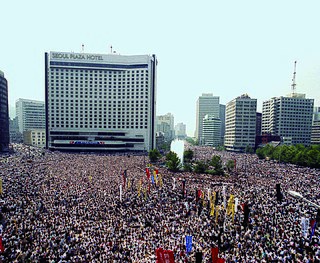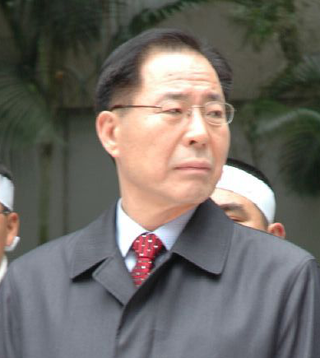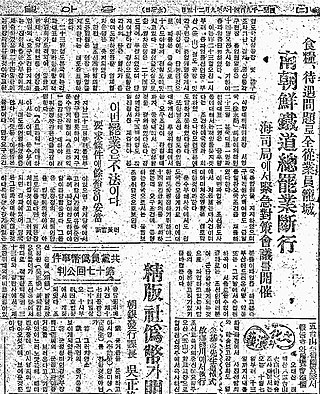Related Research Articles

The International Confederation of Free Trade Unions (ICFTU) was an international trade union. It came into being on 7 December 1949 following a split within the World Federation of Trade Unions (WFTU), and was dissolved on 31 October 2006 when it merged with the World Confederation of Labour (WCL) to form the International Trade Union Confederation (ITUC).
Industrial unionism is a trade union organising method through which all workers in the same industry are organized into the same union, regardless of skill or trade, thus giving workers in one industry, or in all industries, more leverage in bargaining and in strike situations. De Leon believed that militarized Industrial unions would be the vehicle of class struggle.
The Korean Confederation of Trade Unions (KCTU), literally translated as National Confederation of Democratic Trade Unions, also known as Minju-nochong, is a national trade union centre in South Korea officially established in 1995. Its predecessor was the National Council of Trade Unions (NCTU), established in 1990 as an independent, democratically operated alternative to the Federation of Korean Trade Unions.
Unions have been compared across countries by growth and decline patterns, by violence levels, and by kinds of political activity.
The Federation of Korean Trade Unions (FKTU) is a national trade union center in South Korea formed in 1960. It represents the company union tendency of the South Korean labour movement, as opposed to the more militant Korean Confederation of Trade Unions (KCTU).
In December 1996 and January 1997, South Korea experienced the largest organized strike in its history, when workers in the automotive and shipbuilding industries refused to work in protest against a law which was to make firing employees easier for employers and curtail labor organizing rights.
The Ministry of Employment and Labor announced on December 30, 2021, that as of 2020, 14.2% of workers were in trade unions in South Korea, a 1.7% increase from 12.5% in 2019. Korea's unionization rate peaked in 1989 at 19.8% and fell to 10% 2004.
The 2009 May Day protests were a series of international protests that took place across Europe, Asia and in the other parts of the world due to the 2007–2008 financial crisis and the resulting Great Recession. Several May Day marches, which are traditional events, had turned violent in Germany, Turkey and Venezuela as riot police battled protesters in their respective countries. Banks and shops had been attacked in Turkey.

The June Democratic Struggle, also known as the June Democracy Movement and the June Uprising, was a nationwide pro-democracy movement in South Korea that generated mass protests from June 10 to 29, 1987. The demonstrations forced the ruling government to hold direct presidential elections and institute other democratic reforms, which led to the establishment of the Sixth Republic, the present-day government of South Korea.
The 1958Paraguayan general strike was a general strike organized in Paraguay in August 1958, marking the first national general strike in the country. The strike was called by the Confederación Paraguaya de Trabajadores, with demand such as a 30% raise in salaries, a general declaration of amnesty, a lifting of the state of emergency, a more equitable economic policy, securing the freedom to participate in political and trade union activities and the holding of a constituent assembly.

Kwon Young-ghil is a South Korean politician, journalist, and trade unionist. He was a founding member of the People's Victory 21 and Democratic Labour Party.

Kim So-yeon is a labor activist in South Korea and currently on the executive committee of Creating a World Without a Temporary Worker.
The E-Land strike was a strike of South Korean workers waged by the E-Land labor union against the mass-downsizing initiated by New Core Co. and Homever Outlet, affiliated retail organizations of the E-Land Group. The strike, which lasted for 510 days from June 10, 2007, to November 13, 2008, called for the end of the discriminatory system of irregular employment and the reinstatement of dismissed unionized workers.
Women in Asia have been organizing to address workplace issues, such as unequal pay and workplace violence as early as the 1880s. The formation of women's labor unions in South Korea began in the late 1970s with the Minjung movement, as it is based on the mobilization of young female factory workers and martial law suspended labor rights. Women in South Korea are typically irregular workers, who are not protected by labor laws, make up to 35% less in wages than men, and are less likely to be a union member.

The labor movement of South Korea consists of multiple labor movements and organizations that advocate for the rights and well-being of workers. Organizations have emerged with differing political ideologies and methods on how to achieve their respective goals in relation to these workers' rights. South Korean organized labor is also active in other movements, allowing for solidarity between organizations. The movement originated in the 19th century while under Japanese rule as a way to organize workers.
The Migrants' Trade Union (MTU) in Korea was established on May 3, 2005 by 91 workers in South Korea. It was established to address poor working conditions and wage theft, widespread inequality and discrimination at the workplace. MTU has focused on achieving legal rights and recognition for undocumented migrants in South Korea.

The September 1946 Korean general strike was a nationwide strike led by the Communist Party of Korea in which more than 250,000 workers participated. It was fuelled by a growing independence movement after the imposition of the United States Army Military Government in Korea (USAMGIK). Although the strike's events were studied by the South Korean Truth and Reconciliation Commission from 2005 to 2010, they remain disputed.

The 2021–2023 Warrior Met Coal strike was a labor strike in Alabama, United States. The strike began on April 1, 2021 and involved members of the United Mine Workers of America striking against Warrior Met Coal Inc. Warrior Met was formed after the bankruptcy of Walter Energy and operates coal mining facilities in the state. The strike was over the failure of the union and company to agree to a labor contract for the approximately 1,100 union members who work for Warrior Met.
The 2021 South Korean delivery workers strikes are a series of labour strike by delivery workers in South Korea in 2021.
A number of labour strikes were held throughout 2021.
References
- ↑ "South Korea: Militant national strike shows anger against capitalist establishment". 20 October 2021.
- ↑ "Half a Million South Korean Workers Walk off Jobs in General Strike". 19 October 2021.
- ↑ "Minju Noch'ong chohabwŏn su Han'guk Noch'ong ch'ŏt ch'uwŏl…23-nyŏnman e 'che 1 noch'ong' tŭnggŭk". Yŏnhap Nyusŭ. 25 December 2019. Retrieved 26 December 2019.
- ↑ "Thousands of South Korean workers rally in coronavirus-hit Seoul | the Straits Times". The Straits Times. 3 July 2021.
- ↑ "Labor group leader grilled by police over alleged illegalities during rallies". 7 July 2021.
- ↑ "Police book 23 KCTU members for holding massive rally amid pandemic". 19 July 2021.
- ↑ "South Korea's Top Independent Labor Leader Has Been Arrested".
- ↑ "Labor group says 3 members' COVID-19 infections irrelevant to July 3 rally". 27 July 2021.
- ↑ "South Korea trade unionists rally in defiance of coranvirus ban | the Straits Times". The Straits Times. 23 July 2021.
- ↑ "Warrant issued for KCTU head, but arrest remains challenge for police". 16 August 2021.
- ↑ "(LEAD) Police arrest labor umbrella organization head over holding rallies despite COVID-19 ban". 2 September 2021.
- ↑ "Seoul city govt. Bans labor group's planned street rallies this month". 10 October 2021.
- ↑ "Umbrella union to hold large-scale rally during next week's one-day general strike". 14 October 2021.
- ↑ "Union to push ahead with strike despite mounting concerns". 19 October 2021.
- ↑ "Umbrella union's planned strike meets criticism". 18 October 2021.
- ↑ "Labour union stages rallies, strikes in South Korea | the Straits Times". The Straits Times. 20 October 2021.